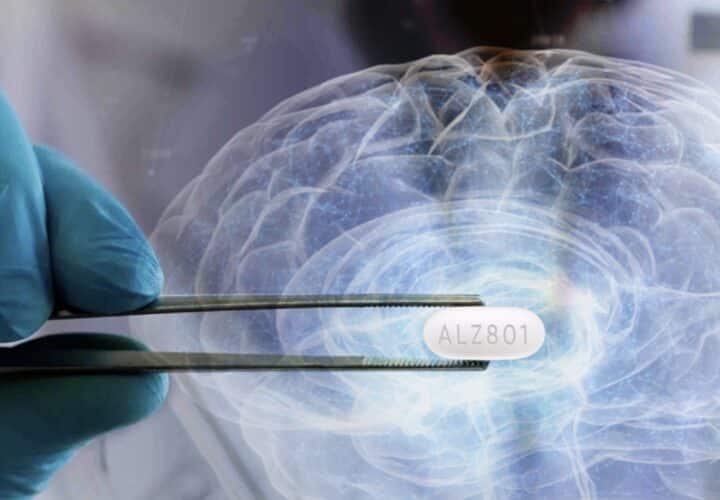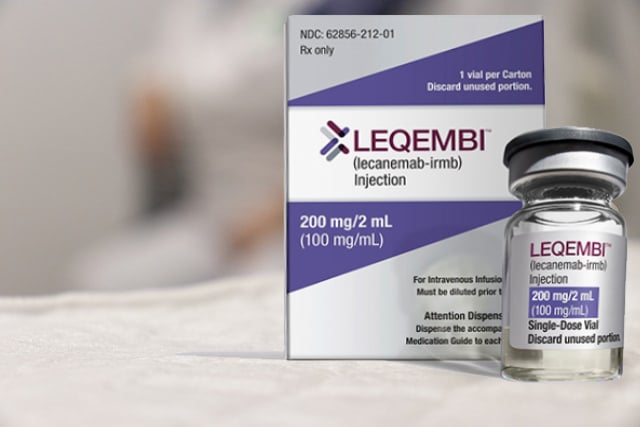This week, Alzheon announced its amyloid-targeting pill failed to slow cognitive decline in early Alzheimer’s but may have made a small difference for people with MCI. The company has not yet decided whether it will seek FDA approval or conduct further studies.
Anti-amyloid drugs like Leqembi and Kisunla are on the market for treating early Alzheimer’s disease, but they are expensive, difficult to access, and only slow disease progression by a small amount. They also carry risks, including brain swelling and small brain bleeds (ARIA). People who have carry copies of the ApoE4 gene — known as homozygotes — known as homozygotes — face the highest risk of these side effects. As a result, some countries have approved the drug with restrictions for ApoE4 homozygotes.
Could a pill provide a safer treatment option for ApoE4 homozygotes? Alzheon’s experimental drug valiltramiprosate, a.k.a. ALZ 801, attempts to do just that. The pill is designed to work by preventing a healthy form of beta-amyloid from turning into a more toxic version. The toxic version of this beta-amyloid protein forms chains called soluble oligomers, which damage the brain.
A first-of-its-kind Phase 3 trial of early Alzheimer’s participants who were all ApoE4 homozygotes put the drug to the test. While the drug proved safe, it failed to slow overall cognitive decline in people with early Alzheimer’s. The Phase 3 trial finished last year, and Alzheon said they would share the results of the study by the end of September. After a nine-month delay, the results were presented on April 1st at the AD/PD 2025 Conference in Vienna, some nine months later than expected.
Some effects appeared promising in a subgroup of participants with mild cognitive impairment, though not across all cognitive and functional measures.
“This research is critical and timely for patients with the APOE4/4 genotype who have mild cognitive impairment, as they have unique needs that may not be fully addressed by current therapies,” Dr. Anton P. Porsteinsson, a member of the company’s scientific advisory board and director of the University of Rochester Alzheimer’s Disease Care, Research and Education Program said in a press release.
What did the Phase 3 study find?
The trial involved 320 participants with two copies of the ApoE4 gene who had mild cognitive impairment or mild Alzheimer’s disease. 162 received the experimental drug, and 158 received the placebo. The primary outcomes looked at cognitive decline as measured by the 85-point ADAS-Cog13 scale, where a higher score indicates more decline. Though the drug was safe and did not cause ARIA, it failed to slow cognitive decline over 1.5 years.
The researchers also looked at a subgroup of participants who had mild cognitive impairment. In this subgroup, 67 received the experimental drug, while 58 received the placebo.
The participants who received the placebo declined by 4.12 points, while those who received the drug declined by 1.98 points on the ADAS-Cog13 scale over 78 weeks. The difference was statistically significant, amounting to a 2.14-point slower decline or a 53 percent relative slowing.
“Fifty percent [slowing] is better than what we have now [with Leqembi and Kisunla],” Susan Abushakra, chief medical officer of Alzheon, told Being Patient..
The drug also showed a statistically significant benefit on a disability scale, scored from 0 to 100, with higher scores indicating more preservation of functional abilities. Participants taking the drug showed a 6.35 improvement on this scale, while those in the placebo group improved by about 0.257 points. This amounts to a difference of 6.093 points, or a 96 percent difference in function.
However, the drug did not show a statistically significant benefit on three other commonly used cognitive function and disability scales. Abushakra emphasized that the study was designed to detect effects across all participants — not in subgroups — making the positive MCI data more speculative and less definitive than the overall negative results.
People with two copies of ApoE4 often experience memory deficits and a faster shrinkage of the hippocampus, which is the region of the brain responsible for memory. The company showed the drug slowed overall brain shrinkage, as well as shrinkage in the hippocampus, which Abushakra said may be a sign of a disease-modifying effect.
The positive effects were driven by participants with MCI. The slowing of cognitive decline was also correlated to the slowing of brain shrinkage in the study.
“Maybe there is a minimum amount of brain tissue that is needed in the hippocampus to translate into a full clinical benefit,” P. Murali Doraiswamy, a professor at Duke University and member of Alzheon’s scientific advisory board, speculated during a conference presentation.
The company also collected cerebrospinal fluid and blood to measure biomarkers of Alzheimer’s disease. The company has not yet completed analyzing that data.
Next steps for Alzheon?
Alzheon plans to publish the results of this trial in a peer-reviewed scientific journal.
The company is still conducting a year-long open-label extension of its Phase 3 trial. An open-label extension allows all the participants in the Phase 3 trial — including those previously assigned to the placebo group — to receive the experimental drug.
Will Alzheon file for approval based on this data or conduct an additional clinical trial looking at MCI? The next steps aren’t set in stone.
“Our regulatory strategy is evolving as we are in discussions with regulatory agencies,” said Abushakra. “A precision medicine approach is key to addressing the needs of Alzheimer’s patients who have the ApoE4/4 genotype, and we are committed to partnering with regulatory authorities to bring valiltramiprosate to appropriate patients as quickly as possible.”





Is there any safe drugs better beside what my husband is taking at present Memantine 20 mg daily nocte . He is in his 3rd year since diagnosis . I will give an arm and a limb to get a drug to slow down his Alzheimer’s symptom . I have fund raised and donated to the society on our Golden anniversary party .
Hi, thanks so much for getting in touch. Alzheon’s drug is currently not approved by the FDA. In terms of drugs for your husband, what matters is his stage of the disease. Some drugs, like anti-amyloids Leqembi and Kisunla are only prescribed in the earliest stages of Alzheimer’s disease – and patients do better if they’re still in the MCI stage. These drugs might slow the course of the disease a small bit but might not be a fit for every patient because the benefit is small, the drugs require infusions at specialty clinics, if you aren’t covered by Medicare they are expensive, and some people might be vulnerable to side effects.
For other drugs, called cholinesterase inhibitors, they help manage symptoms but will likely not slow the course of the disease. The right drug and dose will depend on the types of side effects your husband can tolerate – some are available as patches, oral solutions and pills with different side effects profiles.
You should speak with a doctor to understand what stage your husband is in and ask them about what options might be available. Take care.